German Chancellor Olaf Scholz © Federal Government/Kugler
Olaf Scholz is not Cicero. Nor John Fitzgerald Kennedy or Martin Luther King.
Passionate speeches that move and carry you away are not his thing. The tone of his speech on Europe at Charles University in Prague was more reminiscent of a soporific television programme. One might have expected the German Chancellor to show a little more daring in terms of content. He could, for example, have made an uncompromising analysis of the state of the European Union.
But that is not how it turned out.
When Scholz defended concrete proposals in his speech on 29 August 2022, it was mainly a matter of tactics. The creation of a European air defence system or the admission of Bulgaria, Romania and Croatia as full members of the Schengen area are important points. But they do not represent a vision for the future of the EU.
”When, if not now? Who, if not us?” By quoting this slogan of the Czech students who triggered the Velvet Revolution in 1989, Chancellor Olaf Scholz placed his first major ”Europe speech” in a historical continuity. As an explicit response to French President Emmanuel Macron’s Europe speech at the Sorbonne in 2017, he had chosen Charles University in Prague to present German proposals for reforming the European Union. This German position was eagerly awaited in the run-up to the European summits in October, where the “future of Europe” is to be shaped.
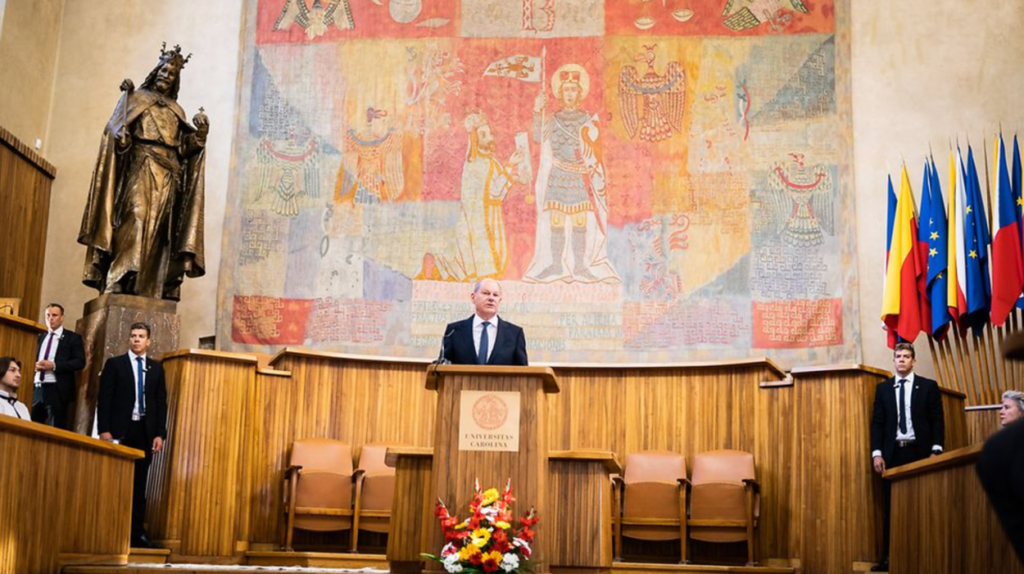
A TROUBLESOME LEGACY
Angela Merkel has undoubtedly left her mark on modern German history. Her rise to power in 2005 and her extraordinary longevity – comparable only to that of Konrad Adenauer (1949-1963) and Helmut Kohl (1982-1998) – make her a central figure in current German and European politics.
However, after the end of her last term in 2021, her party (CDU-CSU, Christian Democrats) and her designated successor Armin Laschet were voted out at the ballot box.
The new leadership, headed by 63-year-old Social Democrat Olaf Scholz, apparently wants to pursue a somewhat different course than in the past 16 years. But will this government, which includes the Social Democrats of the SPD, the Greens and the Liberals (FDP), be able to distance itself completely from the Merkel era?
There is a relative continuity between the new government and the era of Angela Merkel. The CDU/CSU has often governed with the SPD, the Greens and the FDP: Merkel was allied with the SPD from 2005 to 2009 and again from 2013 to 2021.
If Olaf Scholz is described as a “reassuring” chancellor, it is also because he wants to display the same sobriety as Merkel. Moreover, the two major parties of the left and the right have more or less advocated the same policies in terms of content: Reducing public spending, improving competitiveness, supporting demographics, openness to immigration, etc.
Merkel had even taken up some of the SPD’s themes to better weaken it and demobilise its voters, breaking with the taboos of the right on several issues: Announcement of the nuclear phase-out in 2011, admission of one million migrants in 2015, introduction of a statutory minimum wage in 2015.
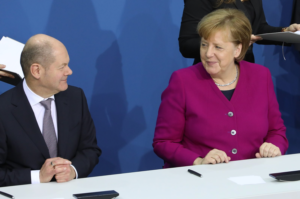
In this way, the German Christian Democrats have adopted some of the historic demands of the SPD and the Greens. At the European level, Merkel also enjoyed the support of the SPD and the Greens – then in opposition – at the height of the 2010 currency crisis. Without their support, it would not have been certain that she could have passed the aid plans for Greece or the creation of the European Stability Mechanism to save the euro.
But the former chancellor’s record paradoxically opens up new possibilities for the new government. The many measures that the left advocated under Angela Merkel – phasing out nuclear energy, openness to immigration, but also same-sex marriage – allow the Scholz cabinet to go even further: decarbonisation planned for 2030, raising the minimum wage to 12 euros an hour, and investments in digital technology, education and ecological change that could total 100 billion euros.
This level of spending is made possible by the solid financial position of the German state, whose debt has fallen significantly under Angela Merkel. Nevertheless, Olaf Scholz wants to stick to the debt brake, which was written into the Basic Law in 2009 with the support of the SPD and which prevents the German state from spending more money than it collects in taxes.
The new government’s ambitions are high, especially for the Greens, who seek a rapid decarbonisation of the economy and envisage much higher investment than their partners in their programme, but the legal restrictions inherited from the Merkel era could cause problems in the long run.
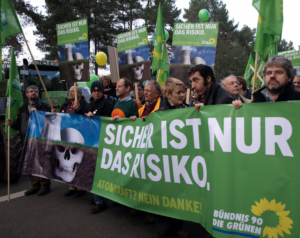
In European policy, the new government is taking up the legacy left by Merkel on two levels. First, it wants to maintain the European Stability Pact and avoid a rise in inflation in the Eurozone. According to the coalition agreement between the three parties, it is even about strengthening the instruments to control public spending in Europe.
Furthermore, Olaf Scholz and his allies want to continue to use the budgetary leeway introduced during the Covid 19 crisis under Angela Merkel. On these two points, the new government is building on the policies of the former chancellor.
But Scholz and his allies are also breaking with Merkel’s policy, which had severely strained relations between Germany and its partners during the euro crisis. They are recalling a federalist orientation not seen in Germany since the 1990s and the ambitious plans of Helmut Kohl and François Mitterrand to strengthen Europe.
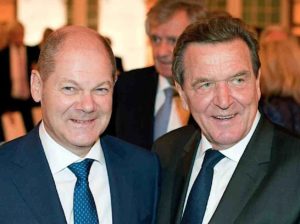
The coalition agreement between the SPD, FDP and Greens talks about a “European federal state”. The text goes on to say: ”We want to strengthen Europe’s strategic sovereignty. This means above all expanding its own capacity to act in the global context and being less dependent and vulnerable in strategically important areas such as energy supply, health, raw material imports and digital technology, without isolating Europe”.
At the same time, Scholz and his partners emphasise their desire to maintain good relations with the United States, as the CDU/CSU had done under Merkel. They break with the line of relative independence from Washington initiated by Gerhard Schröder, who refused to participate in the Iraq war in 2003. The tone is changing, especially under the influence of the Green Party leader Annalena Baerbock, who is now German Foreign Minister and is already taking a tough stance on China.
A graduate in international law, she is known for her commitment to human rights, even though she holds moderate views among the relatively pragmatic Greens. Although Beijing is the biggest international customer of German companies, the government wants to denounce the abuses against the Uyghurs and the pressure on Taiwan, for example. This is a turning point compared to the governments led by Angela Merkel.
A LEFT-LEANING YOUTH
Born on 14 June 1958 in Osnabrueck, the son of a travelling salesman and a housewife, he grew up in a north-eastern suburb of Hamburg. In 1975, at the age of 17, he joined the powerful SPD youth movement, the Jusos, and was elected its vice-chairman and vice-president of the International Union of Socialist Youth.

In this capacity, he travelled to the GDR several times and, according to the Bild newspaper, the authorities in the former GDR had recognised him as an “old-school politician with influence”. Consequently, he and his colleagues were given special treatment: “visas for Berlin, no fees” and “polite clearance, no customs checks”. Nevertheless, he was pursued by the Stasi and kept under surveillance in Hamburg.
At the same time, Olaf Scholz studied law and eventually opened a law firm specialising in labour law in 1985. He represented trade unions and cooperative members. Since German reunification in 1990, he represented workers in numerous cases related to the privatisation and break-up of former East German companies.
LONG POLITICAL CAREER
His political career began in 1998, when he was elected to the Hamburg Parliament as MP. At that time he also married his wife Britta Ernst, who is also active in politics and is currently Minister of Education in the state government of Brandenburg.
In 2002, he became Secretary General of the Social Democrats (SPD) under the leadership of former Chancellor Gerhard Schoeder, his political mentor.
When Angela Merkel came to power in 2005 and formed her first grand coalition between the Social Democrats and the CDU, Olaf Scholz was appointed Minister of Labour. Between 2007 and 2009 he was part of the government that helped the country through the financial crisis.
In 2011 he was elected mayor of Hamburg and brought his home city back into social democratic hands. During his time in office, he set up a free crèche for families and launched a massive housing programme. The then 60-year-old returned to the ruling coalition in 2018 as Angela Merkel’s finance minister and vice chancellor.
RIGHT WING OF THE SPD
Many in the SPD considered Olaf Scholz “too centrist – or even too right-wing”. He played an important role in introducing Gerhard Schröder’s liberal labour market reforms in the 2000s. Scholz’s involvement in ‘Agenda 2010’, which led to substantial budget cuts in social benefits, earned him heavy criticism from the left wing of the SPD. As Minister of Labour and Social Affairs, Olaf Scholz also raised the retirement age to 67.
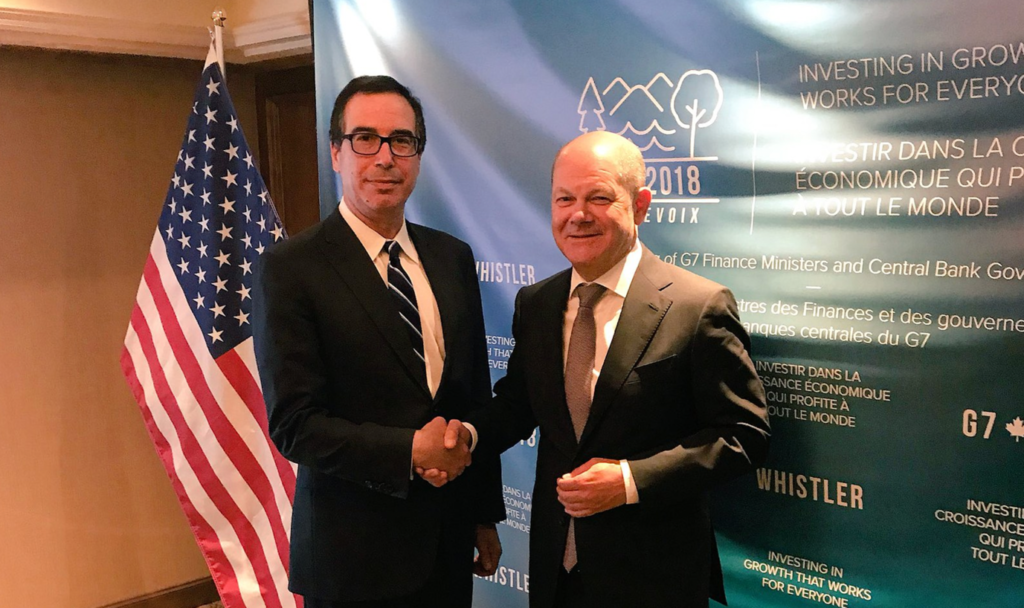
His centrist, even right-wing stance contributed to his being marginalised within his party, so that activists and party loyalists removed him from the presidency in 2019. Olaf Scholz, however, managed to get back on his feet thanks to the Covid 19 pandemic, not hesitating to defy prevailing opinion and push public spending to the extreme.
Despite being disavowed in 2019, the SPD, one of the oldest political parties in Europe, elected him to defend its colours. His rise to power, however, came as a surprise. In the summer of 2020, the Social Democratic Party was credited with only 15% of the vote, while the Conservatives (CDU-CSU) got almost 40% and the Greens almost 20%.
For many Germans, the enthusiastic jogger was still relatively unknown. But he managed to convince them with direct messages that appealed to voters: no tax cuts for the rich, stable pensions, more social housing and a carbon-neutral economy.
THE ‘SCHOLZOMAT’ IN ANGELA MERKEL’S FOOTSTEPS
He was regularly ridiculed in the press for his stern demeanour and monotonous, flat speeches, and the Germans gave him the nickname “Scholzomat”, a pun between his surname and the word “Automat”. But maybe that actually did him some good with voters who are still attached to Angela Merkel, who was not exactly known for her passionate speeches.
Although he came from a different party, he positioned himself in the election campaign as her natural successor.
In the media, he is also known as “Vati”, which means “daddy” in German, an allusion to Angela Merkel’s famous nickname “Mutti”, which means “mummy”. Alluding to his resemblance to the former Chancellor, Olaf Scholz even goes so far as to imitate her gestures by holding his hands in front of him in the shape of a rhombus in photos.
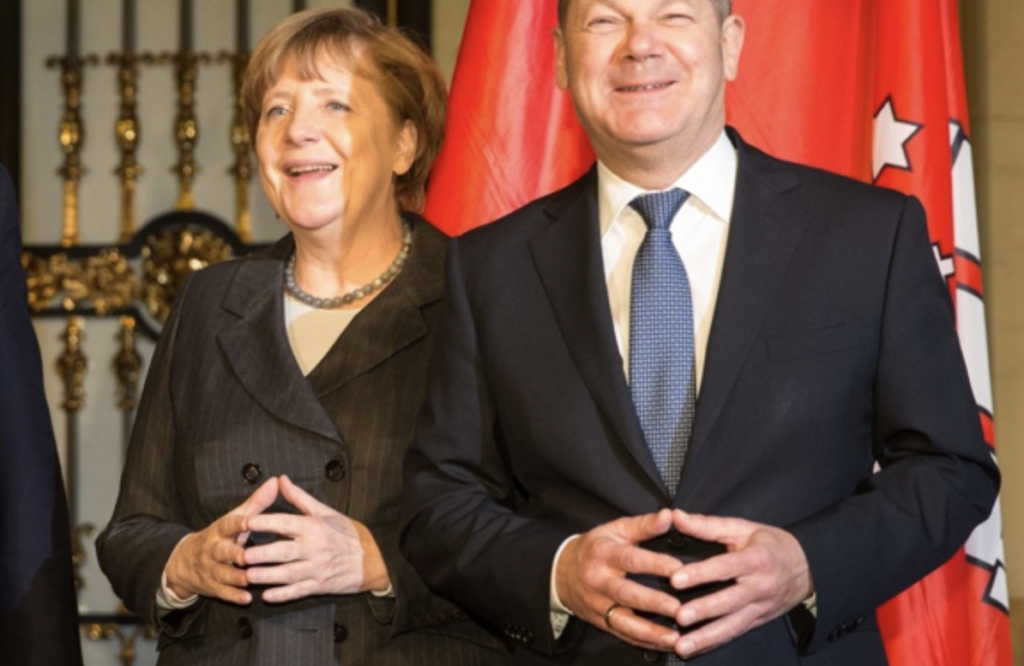
The ‘Merkel-Raute’ or the ‘Merkel Diamond’ in English is a hand position adopted by German Chancellor Angela Merkel in front of her stomach, where the fingertips meet and both thumbs and index fingers form a rough diamond shape. This gesture gradually became her trademark and was regularly used for political purposes.
ALLEGED INVOLVEMENT IN TAX FRAUD
Olaf Scholz’s political career has been marred by a series of cases. Shortly before the Bundestag elections in September 2021, the Social Democrat had to justify himself before the Bundestag’s Finance Committee for the fact that officials in his ministry had not passed on information about an alleged money laundering operation to the judiciary.
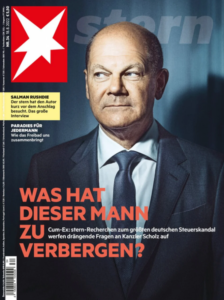
After years of investigation, the so-called “CumEx scandal” is now tarnishing the image of the German head of government, who was asked last August to provide explanations about this case of tax fraud on dividends. According to the German press, an email implicated Olaf Scholz in the irregularities that allowed almost 55 billion euros to be syphoned off from the tax revenues of several European countries, including France.
A parliamentary investigative committee is trying to understand the multiple ramifications of this financial scandal, which was uncovered in 2017. The CumEx affair is about an elaborate tax optimisation scheme set up by banks that allowed foreign investors to reduce their taxes on dividends.
Specifically, Olaf Scholz, who was mayor of Hamburg in 2016, is accused of not prosecuting the local branch of Warburg Bank, which would have had to pay tens of millions of euros in refunds, under pressure from Angela Merkel’s government.
The parliamentary enquiry is to clarify whether the mayor put pressure on the tax office not to collect the taxes. Although Scholz has denied these allegations, new elements uncovered recently have invalidated the former mayor’s denials.
In the flat of another member of the Social Democratic Party who may have played a role in the bank repayment, investigators discovered more than 200,000 euros in cash in a safe deposit box, strengthening suspicions of possible covert financial arrangements.
“NOTHING WILL BE THE SAME AGAIN”
Olaf Scholz does not promise “blood, toil, sweat and tears”, as Winston Churchill did in 1940, but not far from it. In a solemn opinion piece published by the Frankfurter Allgemeine Zeitung, the Chancellor justified the lifestyle change he will demand of Germans by next winter, in an environment approaching a war economy.
In his coalition agreement with the Greens and the Liberals, Olaf Scholz had already struck this tone regarding the epoch and paradigm shift, but in a far less serious form. Now that war has returned to Europe, the chancellor reminds Germans that politics begins with looking at reality.
“This is not an easy road, not even for a strong and prosperous country like ours. We will need staying power. Many citizens are already suffering the consequences of the war, especially the high prices for gas and food. Many are worried about their next electricity, oil or gas bill,” admits the Chancellor, who has promised a 30-billion-euro package to cushion the effects of the crisis.
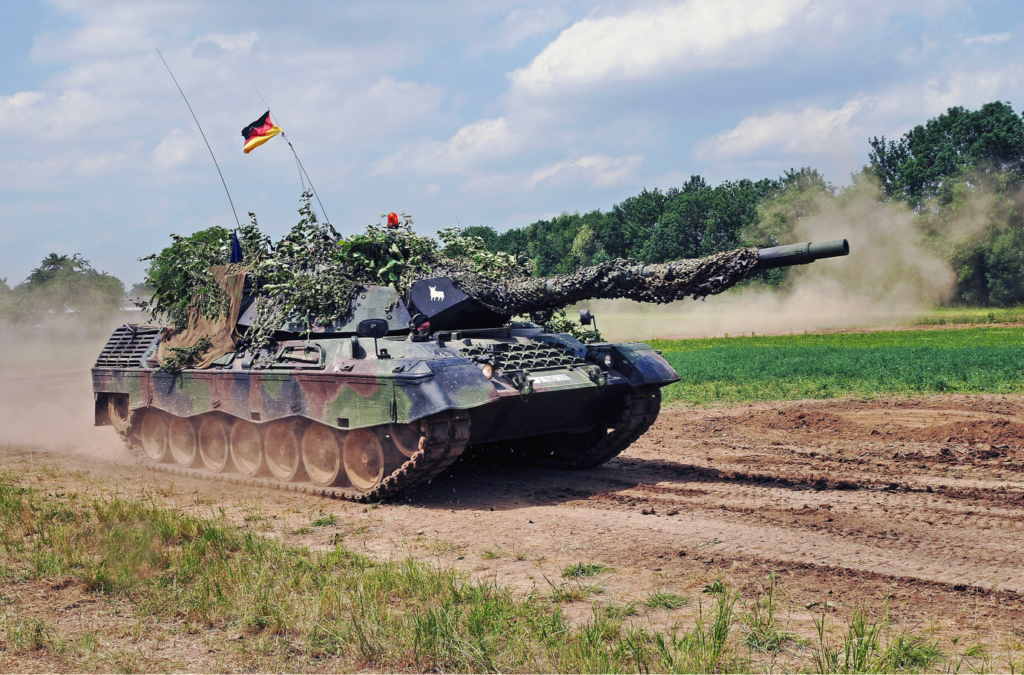
AMBIGUOUS ATTITUDES
And yet its behaviour towards the war in Ukraine seems somewhat contradictory. A month after announcing the delivery of German-made Leopard tanks and giving the green light for the export of armoured vehicles from post-Soviet stocks, the Scholz government is accused by the opposition, its Polish neighbour and Kiev of not keeping its promises.
“I fear that the Chancellor does not want Ukraine to win the war, in the sense that Russian troops will be driven out of the country,” criticised the CDU’s foreign policy spokesman in the Bundestag. Ukrainian Foreign Minister Dmytro Kuleba added: “There is not a single rational argument why these weapons cannot be delivered, only abstract fears and excuses”.
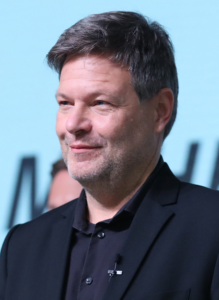
The SPD has always taken a more conciliatory stance towards Russia than its coalition partners. The party’s support for the now-stopped Nord Stream 2 pipeline project, which was condemned by the Greens and the Liberals, was the clearest expression of this disagreement.
This pro-Russian policy of the German left has several roots, going back to the policy of rapprochement with the East (Ostpolitik) under former SPD Chancellor Willy Brandt, but also to an ideological closeness to Russia cultivated by the most radical currents of the German left and driven by a certain anti-Americanism.
However, Olaf Scholz’s reluctance to tighten sanctions should not be interpreted as an expression of a more conciliatory attitude on the part of his party. In an interview with the newspaper Die Zeit, Christian Lindner, the liberal Finance Minister, expressed the same concerns as Robert Habeck, the Green Minister for Economic Affairs and Energy, about the economic consequences of a possible embargo on Russian gas.

State cohesion is thus not fundamentally called into question by the war in Ukraine. Annalena Baerbock and Robert Habeck, the two Green foreign and economic ministers respectively, seem to be the main actors in this crisis, shifting the lines and forcing the Chancellor to make changes. They are the ones who are benefiting from this crisis in terms of popularity, while the Chancellor is being heavily criticised for his inaction.
The criticism that is being levelled at Germany in this crisis is above all an expression of Germany’s prominent position in Europe, which demands more responsibility from it than from its European partners.
But this critical attitude, which can be observed in a number of other European countries, does not seem to be the most courageous. In a way, these countries hide behind German restraint in order not to have to make decisions that would have destabilising consequences for their economies and European society as a whole – and could well contribute to strengthening extremist politics in Europe.
It is true, however, that on 27 February 2022, the Chancellor made a historic speech in the Bundestag about the turning point in security policy, including arms deliveries to conflict areas, which raised great expectations that Germany would finally assume the geopolitical role that its status as a leading European economy entitles it to.
For the time being, it must be noted that this speech has not been followed by action and that Olaf Scholz’s Germany still seems to have difficulties establishing itself as a real central power in Europe.

